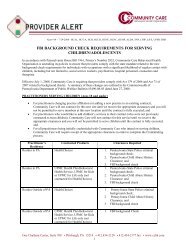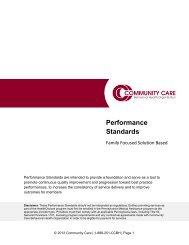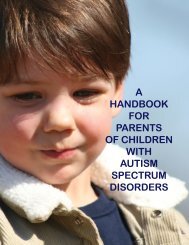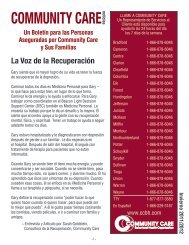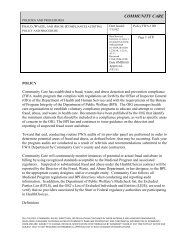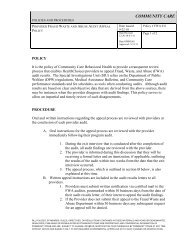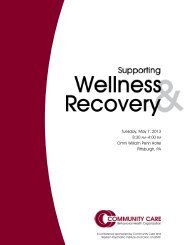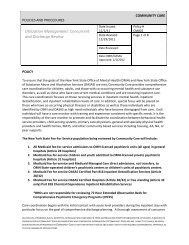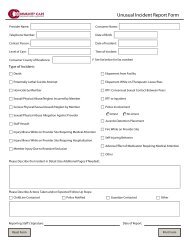Billing Manual for Community Care Network Providers
Billing Manual for Community Care Network Providers
Billing Manual for Community Care Network Providers
You also want an ePaper? Increase the reach of your titles
YUMPU automatically turns print PDFs into web optimized ePapers that Google loves.
“A self-determined and holistic journey that people undertake to heal and grow.Recovery is facilitated by relationships and environments that provide hope,empowerment, choices and opportunities that promote people reaching their fullpotential as individuals and community members.”It includes consumer choice, self-determination, and acceptance, and is designed toreach individuals and families at risk of crisis or disability; stimulate, facilitate, andsupport recovery <strong>for</strong> persons with behavioral health disorders; enable recovery; andpromote individual, family, and community health and well-being.To help <strong>Community</strong> <strong>Care</strong> representatives (including providers) understand andparticipate in <strong>Community</strong> <strong>Care</strong>’s vision, we share these definitions: Culture is the patterns of behavior that include communications, actions, customs,beliefs, values, and institutions of a social group. Cultural Identity includes, but is not limited to race, ethnicity, language, age, regionor country of origin, degree of acculturation, gender, socioeconomic class, religiousbeliefs, and gender. Cultural Awareness is the understanding that people are shaped by the social,linguistic, ethnic, and behavioral characteristics of the cultures to which they belongand that there are patterns of expressions, beliefs, values, and practices that can beshown to enable those providing behavioral health care to understand the diversityof people. Cultural Sensitivity is knowledge about the social, linguistic, ethnic, behavioral andinteractional characteristics of a group or population, how those behaviors andcharacteristics may influence a group’s worldview and the demonstration of thisknowledge through provider and organizational interactions and communications. Cultural Competence is the ability to systematically translate knowledge andunderstanding of the social, behavioral, and interactional differences of groups intoattitudes and practices of care, such as acknowledgment, inclusion, and helpfulnessthat promote the behavioral health and well-being of individuals, families, andcommunities.Cultural competence is an essential part of this vision. It benefits <strong>Community</strong> <strong>Care</strong>’snetwork of behavioral health providers by generating trust and maintaining credibilitywith members, agencies, and the community. Cultural competence demonstrates acommitment to eliminating barriers that prevent our agencies from meeting theirpotential and full responsibilities to their communities. That commitment is proventhrough effective policies and administration, effective frontline provision of services,and the evaluation of those services.<strong>Providers</strong> will be in<strong>for</strong>med (through mailings, website articles, <strong>for</strong>ums, and otherinteractions) about <strong>Community</strong> <strong>Care</strong>’s commitment to a culturally competent system ofservices provision, instructed on standards and per<strong>for</strong>mance indicators, providedexamples <strong>for</strong> demonstration of cultural awareness and sensitivity, given assistance and<strong>Community</strong> <strong>Care</strong> Provider <strong>Manual</strong> | 1-888-251-CCBH | © 2012 All Rights Reserved | Page 16



